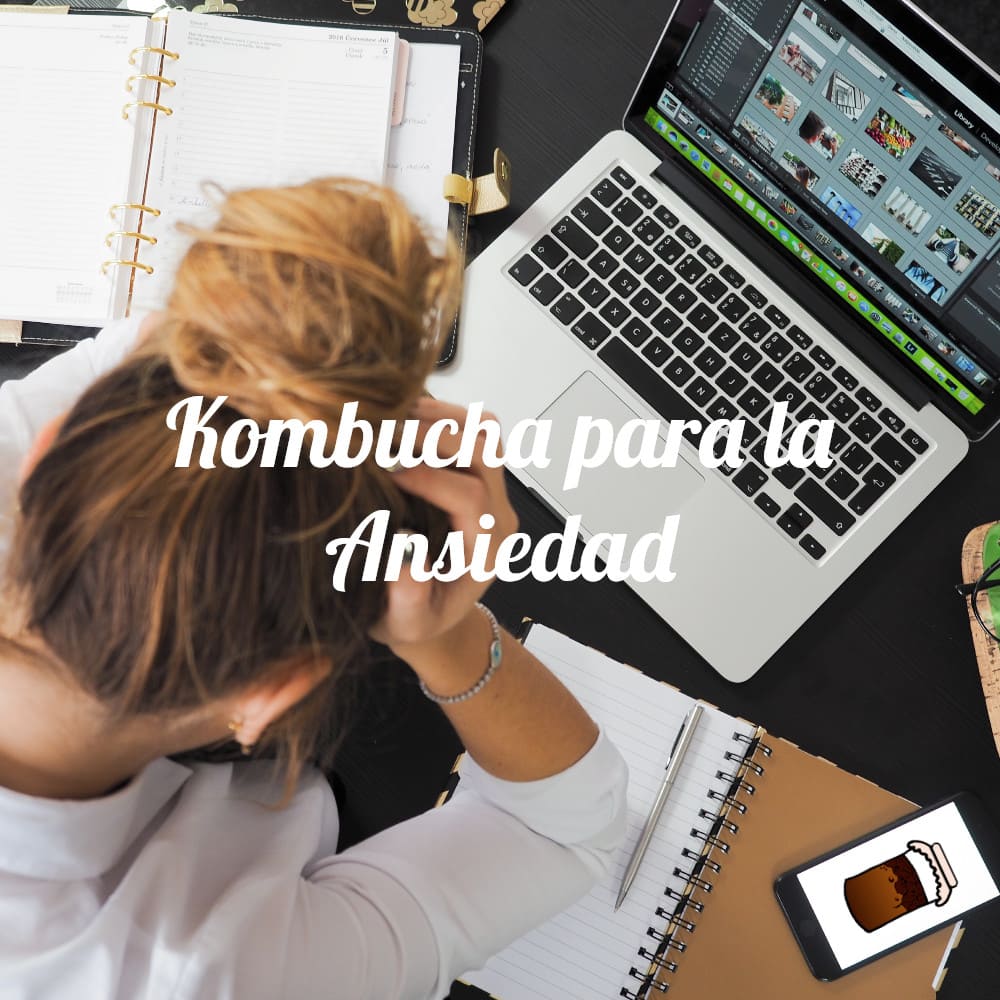The appearance of psychological or emotional problems such as anxiety can arise from various causes and one of these is related to microbial imbalance in the gastrointestinal tract, which for many is surprising because how is it possible that the intestine is related to mood?
Several studies have found a relationship between the gut microbiota and the central nervous system through several mechanisms called the “gut-brain axis”. Good nutrition helps keep many of the functional and structural features of organs in our body, such as the central nervous system (CNS), stable. [1]
The intestine must be able to absorb nutrients to ensure they receive the necessary amounts. This is why a good intestinal microbial balance is necessary, which is also conditioned by adequate nutrition. [1] [2]
Fermented foods are currently considered a good option and kombucha tea has a high nutritional load with probiotics that can help maintain this microbial balance.
How can you manage anxiety?
It has been shown that mental disorders that occur with depression and anxiety are comorbid with intestinal problems, these may be due to inflammation and intestinal permeability, dysregulation of neurotransmitters, dietary deficiencies, and alteration of the composition of the intestinal microbiome. [2]
A curious thing is that more than 90% of serotonin is produced in the intestine, and serotonin is a neurotransmitter that has a fundamental role in regulating moods, therefore, it is presumed that by improving the intestinal microbiota moods can be improved.
And it appears that kombucha’s anti-inflammatory, nutritional, probiotic, and highly bioavailable properties can correct these conditions.
This drink contains amino acids, caffeine, theophylline, theobromine, ascorbic acid, and B vitamins that are necessary for the metabolism of the nervous system, helping to relieve headaches and anxiety. [2]
Also during fermentation they convert food substrates into more nutritious and functional products, which have the ability to modify the intestinal microbiota.
It is believed that fermented foods could modulate the microbiome-gut-brain axis thanks to their components obtained during fermentation such as beneficial microorganisms (probiotics), substrates that enhance the proliferation of beneficial bacteria in the intestine (prebiotics) and bioactive components (biogenic), based on animal experimentation. [3]
Can the anti-inflammatory effect fight anxiety?
In several laboratories it has been indicated that innate immune activation and the release of inflammatory cytokines preferentially affect the regions of the brain associated with the threat state, generating changes in emotional and behavioral states, so blocking inflammation could work as a treatment strategy.
Although mood disorders have a complex development with different etiologies, inflammation is believed to be related to the disease process and cause discrete symptoms in a variety of patients, behavioral symptoms relevant to mood and anxiety disorders are present.
It is possible that kombucha or any other substance with anti-inflammatory effect can relieve the symptoms of some mental pathologies affected by inflammatory processes, it has also been shown that stimulating weight loss leads to antidepressant or anxiolytic effects and reduces inflammation over time. [4] [5]
A high relationship between anxiety and depression was also observed in those with inflammatory bowel disease and irritable bowel syndrome, and in individuals with anxiety and depression, also those in remission, a different microbial composition was found than in control (healthy) people. [6] [7]
This is another big argument, since the very conclusion of the study was that anxiety and depression in patients with inflammatory bowel disease could be reactive to poor nutrition and imbalances in the gut microbiota.
Are kombucha polyphenols useful for anxiety?
Alterations in oxidative metabolism are implicated in anxiety disorders, elevated levels of anxiety and depression, so the use of antioxidants has been considered as a novel approach for the prevention or treatment of these diseases.
Some foods like fruits and vegetables can offer polyphenols that are natural antioxidants, and beverages like tea or kombucha provide a lot of these in turn. [8]
Polyphenols may have pharmacological actions on the CNS, with cellular and molecular mechanisms similar to those of anxiolytics and antidepressants.
Therefore, a varied diet rich in natural polyphenols could be an effective means of preventing (or delaying) anxiety, depression and other diseases related to oxidative stress. In addition to helping in the control of behaviors of depressive anxious type. [9]
It was also found that food-based polyphenols are widely known for their biological properties to improve cognition and neuroprotection, and some may also increase cell proliferation and differentiation in models of anxiety and depression. [10]
Are the vitamins offered in kombucha tea good for depression and anxiety?
The deficits of some vitamins affect the brain tissues damaging the proper functioning of this, so that psychic / emotional imbalances such as depression and anxiety are generated, where the replacement of these nutrients can significantly reduce this mental alteration.
Kombucha provides a variety of vitamins of great importance such as vitamin C or B complex. These contribute to the metabolic functions of the body and an adequate intake can reduce stress, anxiety, depression, boost memory and relieve premenstrual syndrome. [11]
It also provides vitamin C that participates in neuronal transmission and metabolism of neurotransmitters, if it is at very low levels in the cerebrospinal fluid, it will negatively affect brain function. Its replacement would significantly help mental stability. [12]
And vitamin D regulates levels of neurotransmitters, including dopamine, serotonin, and nerve growth factor secretion, as well as being involved in microbiome formation and reducing gut inflammation.
Although its replacement will only serve in those with anxiety due to deficiency of this vitamin. [13]
Can kombucha cause anxiety?
Kombucha has a fairly low caffeine content, although in the amounts offered by the drink only generates a state of alertness, which by the way is considered beneficial for many people, there are people more sensitive to caffeine who may have some anomaly in mood.
Very high caffeine intake (greater than 1000mg) is a risk factor associated with anxiety and depression, but it was also found that lower doses also generated anxious symptoms in certain groups of people. [14] [15]
Some people may have a genotype that predisposes them to a greater state of anxiety just by consuming products with a low percentage of caffeine, since very low doses are enough to feel the anxiogenic effects of this. [16]
Therefore, kombucha, depending on the product and whether it is taken in excess, could affect the emotional problems of sensitive people.
It is advised for these people to consume less than 400 mg of caffeine per day, since, unlike less sensitive individuals, they may experience adverse effects such as headaches, drowsiness, anxiety, and nausea. [14] [15]
As a reference, depending on the type that was used in its preparation, for every 100 ml of kombucha we have between 4 to 7 mg of caffeine, very little. So it is very little, but very unlikely that you can present a picture of anxiety about drinking kombucha, although the possibility may exist.
In summary, kombucha can be of great help to combat anxiety based on its content of polyphenols and vitamins that play an important role in the nervous system, but also its ability to help the intestinal microbiota is another point that makes us think about the benefits it can have to treat anxiety.
With this we come to the end of the article, I hope you already have more certainties than doubts regarding kombucha for anxiety, hoping that those doubts will go away as new research emerges. We leave you more content that can be very valuable for those who seek to improve their quality of life in an unorthodox way.

